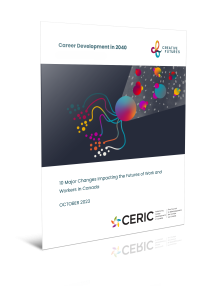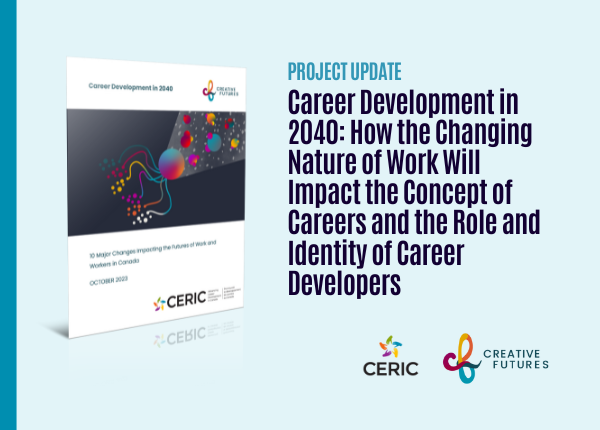Report reveals 10 megatrends that will shape work and careers in 2040
A new CERIC-funded report from Creative Futures Studio Inc. sheds light on 10 megatrends that will shape the future of work in Canada. The report, Career Development in 2040, digs into the trends that workers, employers – as well as those who advise them – need to understand to thrive in a labour market facing massive disruption. Based on an extensive literature review of as well as interviews with career development professionals (CDPs) and career services users, the report highlights 10 major trends:
- Work Anywhere
- AI & Automation
- Living with Climate Change
- Geopolitical Conflicts
- Reconciling the Impacts of Colonialism
- Economic Precarity
- Globalization Under Pressure
- Education, Disrupted
- Declining Mental Health & Well-being
- Generational Shifts
The report also identifies microtrends within each area (32 in total), including the impact of the “green skills revolution” on new jobs creation, greater recognition of the skills of neurodivergent individuals, the increasing popularity of the “learn and earn” model of post-secondary education and how Gen Z’s values-driven approach to work will inform their leadership. 
The purpose of this report is to explore this range of complex changes that may influence career development and career services by 2040, to help CDPs better prepare. Looking forward to 2040, what might be the role of career developers? Will “careers” as they are currently conceptualized exist in the same way, or how might they evolve given current macro-level changes impacting jobs? The year 2040 was selected so that career developers can reasonably anticipate changes over the next 15-20 years and, at the same time, boldly imagine new paths forward.
As the report outlines, we are living in a time of increased uncertainty. As a result, the needs of employers and workers are complex, uncertain and volatile, and by extension, so is the role of CDPs. Based on the major changes described in this report, careers may look very different in 2040. For example, an older workforce can mean new career services specifically designed for the unique needs of seasoned workers who may require age-related accommodations. Depending on how the 10 major changes in the report evolve over time, CDPs might need a range of new skills in the future, such as expanded digital skills that respond to emerging technologies; enhanced mental health interventions; coaching skills related to climate change and many more.
For this report, over 600 secondary sources were studied over the course of two months in 2023, including traditional as well as non-traditional publications. Researchers also conducted interviews with career development practitioners from across Canada who were asked to reflect on changes they were observing in the field, and what it could mean for 15 years in the future. “Users” of career development services were also interviewed about their possible careers in 2040 and the types of supports they could need.
Given the future-oriented focus of this report, it was created using a strategic foresight research approach called horizon scanning. Strategic foresight is a discipline rooted in the academic discipline of futures studies and provides structured and evidence-based methods for understanding our futures. Strategic foresight is not about predicting the future, but instead explores a range of possible futures that could unfold based on changes that can be observed today. Horizon scanning is the approach used to identify these changes, capturing broad social, technological, economic, environmental, political and values-based changes with the potential to impact the future.
The report is the product of a Request for Proposals that CERIC released last year to explore how the changing nature of work will impact the concept of careers and the role and identity of career developers. Creative Futures was contracted to undertake this research project. Creative Futures Studio Inc., helps organizations to understand and apply strategic foresight and social innovation methods so they can make informed decisions about their future.
The next phase of this project will translate the megatrends into three possible scenarios and engage CDPs in a deeper exploration of the possible implications of these changes. In doing so, CDPs will collectively identify key skill requirements, and how services may need to evolve by 2040. The results of this work will be available in early 2024.
Creative Futures co-founders Heather Russek and Jessica Thornton will present their findings at Cannexus, Canada’s Career Development Conference, being held Jan. 29-31, 2024, in Ottawa.

